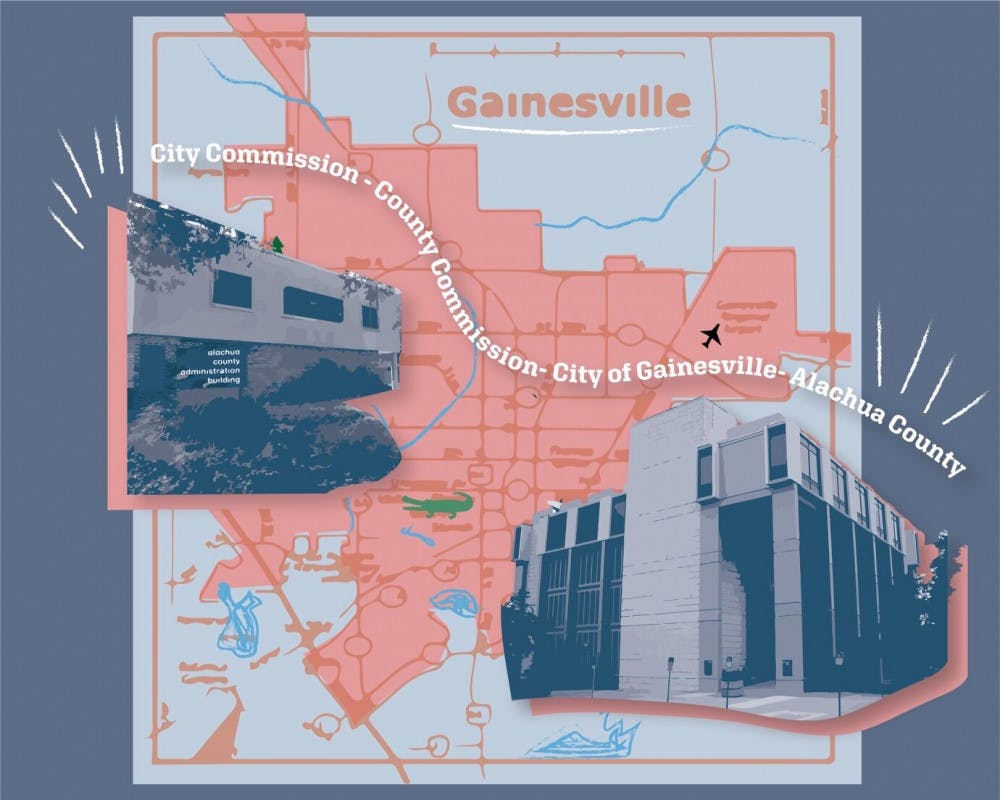When Emily Westerholm was incarcerated, hearing her mother’s voice was what kept her sane. But that sanity was a privilege — her mother could afford to pay for the phone calls.
The Alachua County Commission voted 4-1 April 6 to provide free and unlimited prison phone calls by Oct. 1, an idea proposed by a UF student group. Only Commissioner Chuck Chestnut was in dissent.
Currently, phone calls at the Alachua County Jail cost $0.21 a minute, making a 15-minute phone call around $3. The county takes a cut of $0.09 but will no longer do so starting as soon as possible, according to the vote. Area codes outside of Gainesville are charged more. Often, families of prisoners are billed if a prisoner doesn’t have an account open. If the jailed person is found not guilty in court, the families aren’t refunded.
The county makes around $375,000 each year from jail phone calls, according to a county analysis.
Westerholm, 48, was incarcerated three decades ago in Virginia, and she now runs Gainesville-based nonprofit organization Released, a reentry program for people released from prison. Those phone calls were a lifeline for her and for the people she helps now, she said.
“Being incarcerated is so surreal,” Westerholm said. “It’s like another dimension. When you can’t imagine a world outside of being trapped in a cage and having no control, you just completely lose hope.”
Even more mundane conversations with her mother would make her feel like there was a life waiting for her to return to the outside, she said.
Westerholm worked as a counselor inside two Virginia county jails for about four years, and there she was able to offer inmates free phone calls over her office phone, but on speaker.
Though inmates didn’t get the privacy they needed in those situations, Westerholm still was able to observe how talking to loved ones affected them, she said. For her, it was easy to see it was creating a shift in real time.
“Their demeanor changed, their tone changed,” Westerholm said. “Their body is just so much more relaxed. Their eyes — the focus got soft.”
But not all inmates are lucky enough to have the funds to make that connection.
Over a third of families with relatives in prison across the country go into debt trying to make regular contact, according to an Ella Baker Center for Human Rights study. Residents of Alachua County are no exception.
Thirty-three residents spoke during public comment during the April 6 meeting, and all were in favor of the plan.
Gainesville resident Katlyn Rawls, 25, was one of the speakers.
She spent a year and a half in a Georgia prison — which used the same phone service as Alachua County Jail — for failing to take court-ordered anger management classes, she said. She heard from none of her family members during that time.
The price was $4 per 15 minutes when she was incarcerated; and in order to make a call at all, she had to have $20 in the account — a cost her family couldn’t afford, Rawls said. Her uncle and her cousin died while she was in jail, and she had no idea until she went home. Her mother also almost died in the hospital due to a health scare, another family event she didn’t know about.
“That was the worst year and a half of my life,” Rawls said. “I will never forget that.”
After Rawls was incarcerated, she lost her job because she didn’t have the money to pay for a phone call to let her manager know where she was, she said. Before she went to jail, she knew her mother was very ill — but she had no way of knowing whether she was getting better or worse, Rawls said.
“It was really hard,” she said. “I used to cry myself to sleep every night. I didn’t know whether my mom was OK or not.”
On top of the unknowns, Rawls also experienced hardships inside the jail that she couldn’t talk about with anyone, she said. She experienced conflicts with inmates and guards, but she could have faced retaliation if she tried to report the issues.
“It just gave me a lot of anxiety I’ve never had before,” Rawls said.
If she had the chance to talk to her family at all, Rawls thinks it would have significantly improved her mental health while she was incarcerated, she said.
When she got home from the meeting April 6, she wept in relief.
Providing free, unlimited prison phone calls was originally brought to the commission’s attention by a UF student group called the Florida Student Policy Forum over a year ago. Students write proposals for legislation at a state level and ordinances at a local level.
The Florida Student Policy Forum and the Alachua County Labor Coalition coordinated to bring the proposal before commissioners after the students were working on something similar in the Florida state government.
Graham Bernstein, who wrote the proposal, said it felt bizarre to see something he worked on for so long actually go through. His is the first proposal the organization has seen carry all the way through to implementation.
“All these different effects that were just on paper will now actually play out with real people’s lives,” Bernstein said. “I think that’s an extraordinarily peculiar thing because I’ve never been a part of something like that before.”
After reviewing materials from the Florida Student Policy Forum and several other activist groups, county staff came back to the commission with a few options.
Commissioners originally considered the concept of phasing in unlimited phone calls by starting with five free 15-minute calls a week. But after hearing from the public, Commissioner Anna Prizzia made the motion to implement free, unlimited calls as soon as possible.
“I’ve given this a lot of thought,” Prizzia said. “I didn’t go into this lightly.”
The county will now go through the process of renegotiating its contract with Securus Technologies, the company that owns and operates the prison phones. Because the company currently collects money directly from customers, the contract will need to be revised to allow for the county to subsidize the cost instead.
Several commissioners also discussed terminating the contract at the end of the year if they find a more competitive provider for the phones with better pricing.
Securus Technologies takes $0.12 of the cost per minute, while the county currently makes the remaining $0.09. However, the commission, in the same vote, ruled the county stop taking that money as soon as possible, lowering rates to $0.12 when the county can get a contract amendment with Securus Technologies to make that happen.
When Commissioner Ken Cornell realized the county was making so much money off the phone calls, it changed his perspective. He didn’t want a part of what several residents called “dirty money,” he said.
“The cost, when it went from the backs of the families to the county overseeing it, went from $0.21 to a nickel,” he said. “There’s a lot of profit in that $0.12.”
Chestnut also supports unlimited phone calls but not in the swift way the commission is implementing it, he said. He wasn’t sure the commission had the funds to supplement the full costs of prison calls, so he didn’t vote in favor.
Established as a worst case scenario, the county could end up paying out $1.3 million if there is an upswing in prisoner phone calls once they’re free, according to a presentation from county staff.
Chestnut doesn’t want to make any rash financial decisions considering Gainesville’s growing debt, and he isn’t comfortable with the plan to make the phone calls free as it is now, he said.
“I’ve always been a guy that likes to do things by numbers,” Chestnut said. “Instead of being reactionary and emotional about it, I just want to be fiscally sound when we do it.”
Contact Siena at sduncan@alligator.org. Follow her on Twitter @SienaDuncan.

Siena Duncan is the Fall 2024 Editor-in-Chief of the Alligator. She's interned for the Salt Lake Tribune, the Tampa Bay Times and POLITICO. In her spare time, she loves to take walks to see the cows by her apartment and add more to her sketchbook.






